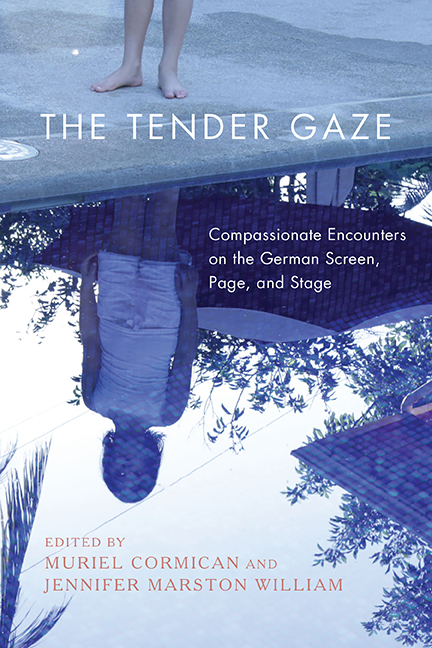Book contents
- Frontmatter
- Contents
- Acknowledgments
- Introduction: The Tender Gaze
- 1 Toward a Theory of the Tender Gaze: Affect, Critical Insight, and Empathy in Contemporary German Cinema
- 2 The Tender Gaze, Embodied Politics, and Perspective-Taking in German Postdramatic Theater
- 3 Face to Face: Race, Gender, and the Gaze in Mo Asumang’s Die Arier
- 4 “Risse, hinter denen man einen Kern entdeckt, der so ähnlich ist wie die Herzen von uns allen”: The Tender Gaze in Umut Dağ’s Risse im Beton
- 5 Looking through the Eyes of Empathy: Encouraging a Culture of Caring and Compassion in Doris Dörrie’s Keiner liebt mich
- 6 The Tender and Transgressive Beast Within: Escape Narratives in Films by Krebitz, Stuber, and Speckenbach
- 7 Looking at Looking in Margarethe von Trotta’s Das Versprechen
- 8 A Queer Phenomenology of Gender in Maren Ade’s Alle Anderen and Toni Erdmann
- 9 Rilke’s “Schauen”
- 10 Pity Stares or Tender Gaze? Seeing Disability in Nineteenth-Century Austrian and German Literature
- 11 The Sociohistorical and Gendered Implications of Gazing Tenderly in Ludwig Tieck’s “Liebeszauber”
- 12 Mothering, Animals, and the Surveillance State in the Anthropocene: An Ecofeminist Reading of Birgit Vanderbeke’s Die Frau mit dem Hund
- Notes on the Contributors
- Index
12 - Mothering, Animals, and the Surveillance State in the Anthropocene: An Ecofeminist Reading of Birgit Vanderbeke’s Die Frau mit dem Hund
Published online by Cambridge University Press: 05 October 2022
- Frontmatter
- Contents
- Acknowledgments
- Introduction: The Tender Gaze
- 1 Toward a Theory of the Tender Gaze: Affect, Critical Insight, and Empathy in Contemporary German Cinema
- 2 The Tender Gaze, Embodied Politics, and Perspective-Taking in German Postdramatic Theater
- 3 Face to Face: Race, Gender, and the Gaze in Mo Asumang’s Die Arier
- 4 “Risse, hinter denen man einen Kern entdeckt, der so ähnlich ist wie die Herzen von uns allen”: The Tender Gaze in Umut Dağ’s Risse im Beton
- 5 Looking through the Eyes of Empathy: Encouraging a Culture of Caring and Compassion in Doris Dörrie’s Keiner liebt mich
- 6 The Tender and Transgressive Beast Within: Escape Narratives in Films by Krebitz, Stuber, and Speckenbach
- 7 Looking at Looking in Margarethe von Trotta’s Das Versprechen
- 8 A Queer Phenomenology of Gender in Maren Ade’s Alle Anderen and Toni Erdmann
- 9 Rilke’s “Schauen”
- 10 Pity Stares or Tender Gaze? Seeing Disability in Nineteenth-Century Austrian and German Literature
- 11 The Sociohistorical and Gendered Implications of Gazing Tenderly in Ludwig Tieck’s “Liebeszauber”
- 12 Mothering, Animals, and the Surveillance State in the Anthropocene: An Ecofeminist Reading of Birgit Vanderbeke’s Die Frau mit dem Hund
- Notes on the Contributors
- Index
Summary
BIRGIT VANDERBEKE'S NOVEL Die Frau mit dem Hund (The Woman with the Dog, 2012) shows the positive potential for extending empathy to the marginalized and to the ecosystems that sustain us. It also presents a warning, however, against the potential abuses of a tender gaze that is merely a pretense used to manipulate others. The novel imagines a near future in which the world is divided into a metropolis led by a corporate surveillance state called the Stiftung on the one hand, and what appears to be a post-apocalyptic wilderness on the other hand. Pola, the protagonist of the novel, and her dog Zsazsa threaten this false dichotomy of the civilized metropolis and the savage wilderness. Pola lives in the former industrial suburbs of the city, a largely abandoned and unregulated area, which is nicknamed Detroit by the citizens of the Stiftung due to its stereotypical association with economic decline and crime. She enters the sphere of the Stiftung because she is pregnant and afraid of giving birth alone outside the city. Together with her companion animal, she seeks refuge in an apartment building, where Jule, a woman who lives there, reluctantly gives her shelter in her home. Since Jule is worried about breaking the rules of the Stiftung, after the first night her neighbor Timon takes in Pola and Zsazsa and hides them in the attic. Pola and her dog change Jule's and Timon's lives by showing them that the Stiftung is not what it claims to be, and that it has altered not only the environment through animal-extinction efforts but also its citizens through chemicals it uses. Because she does not have the right registration to receive health care from the Stiftung, Pola has to give birth alone in the attic of the apartment building. In the end, Timon leaves the city with Pola, her baby, and Zsazsa, and Jule is left behind questioning her own dogmatic belief in a life under the Stiftung.
Vanderbeke's dystopia offers a twist on the punitive surveillance state. In contrast to the panopticon, which is predicated on overt surveillance and control, the districts of the metropolis operate under the guise of protection. “Stiftung” can be translated into English as “foundation” or “charity.”
- Type
- Chapter
- Information
- The Tender GazeCompassionate Encounters on the German Screen, Page, and Stage, pp. 206 - 220Publisher: Boydell & BrewerPrint publication year: 2021

